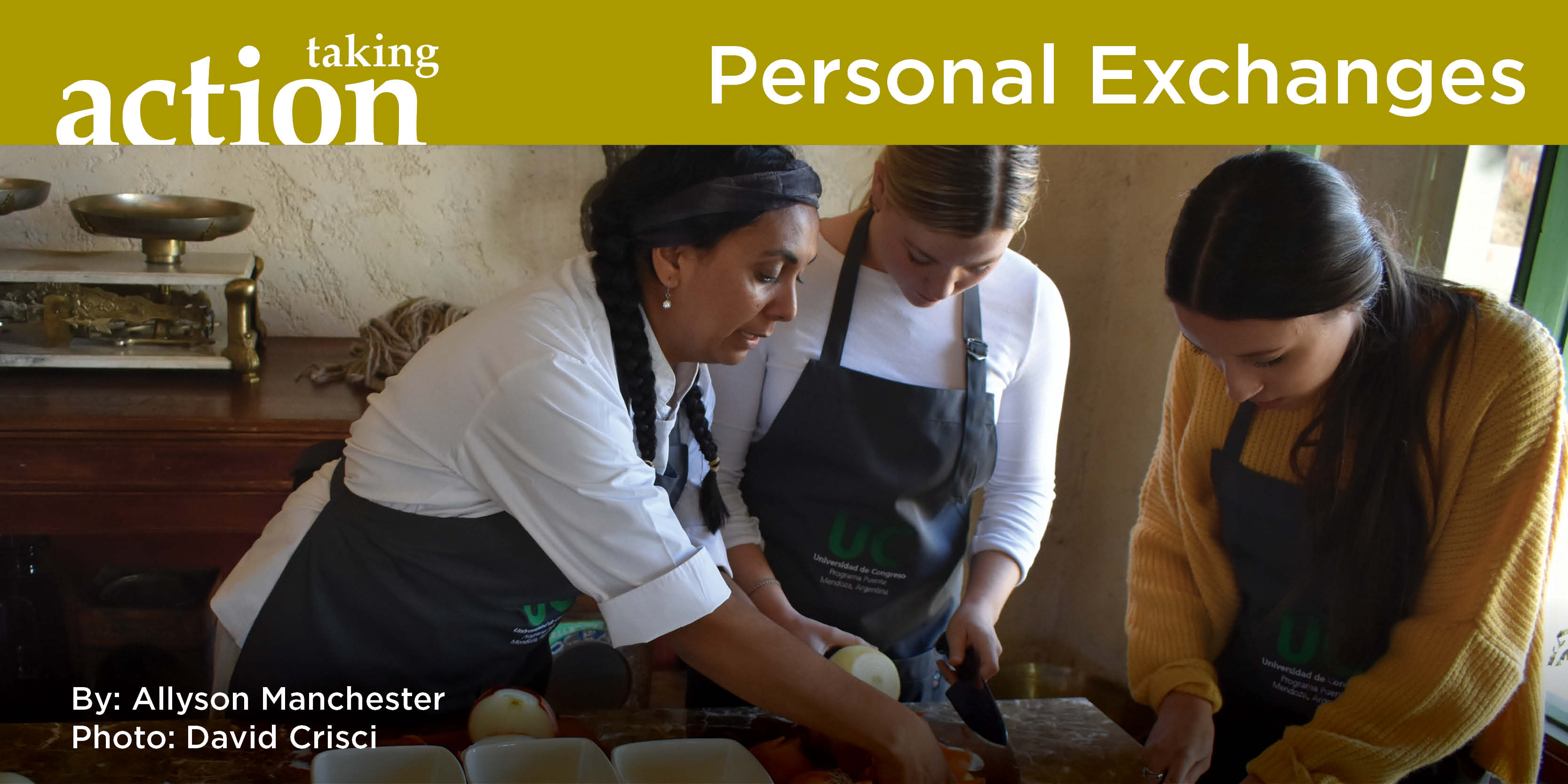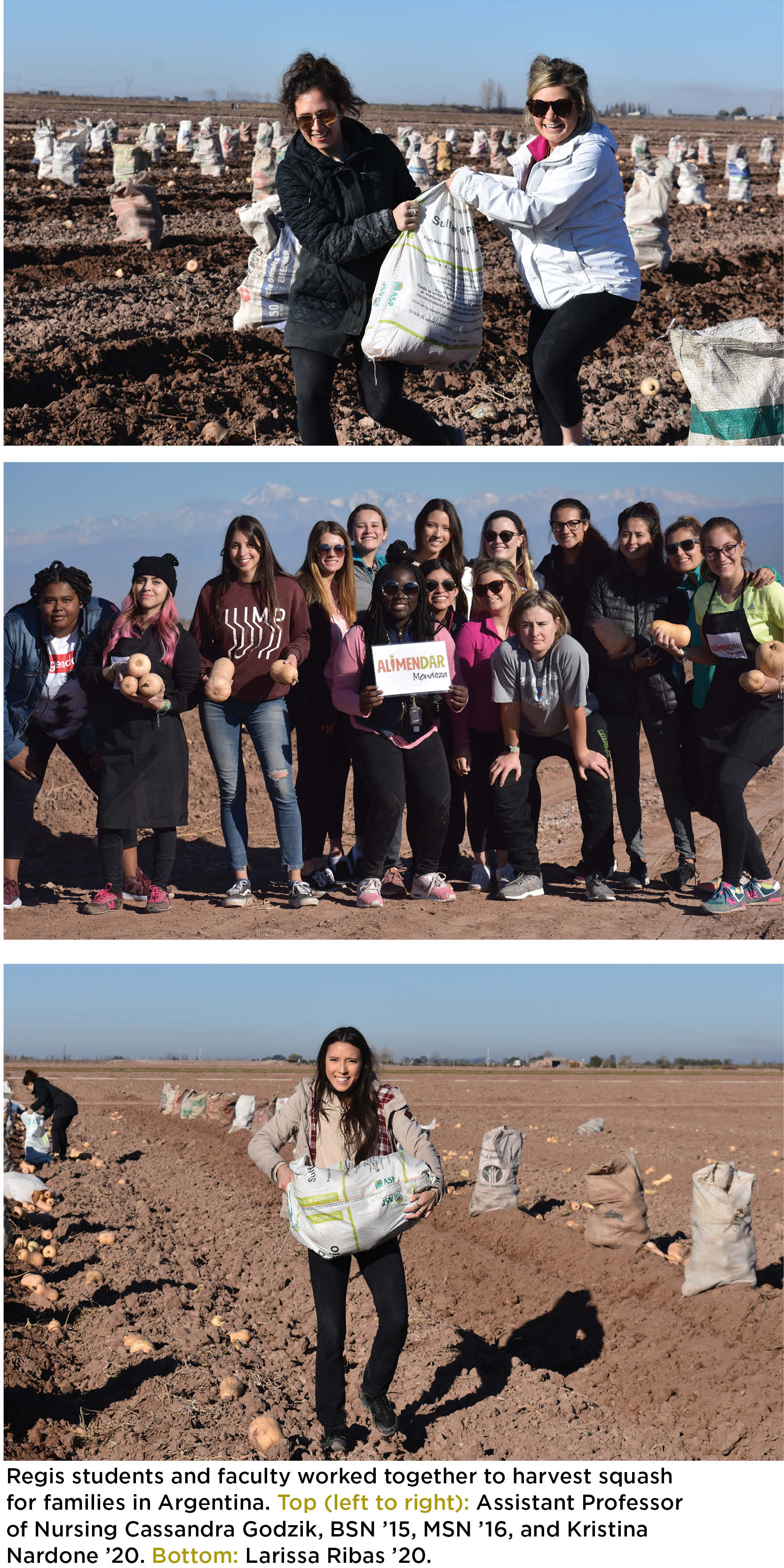
Nursing students build authentic community relationships through local and international partnerships
When nursing students Eileen Gomez ’20, Kristina Nardone ’20, and Larissa Ribas ’20 arrived in Mendoza, Argentina, as part of a new Regis exchange program, it didn’t take long for them to realize that the most impactful moments of the trip would be interacting with the local population. Their first stop: a tour of Fundación CONIN Mendoza, a nonprofit nutritional clinic that serves children who are malnourished.
“It was eye-opening to witness the health complications that result from malnutrition,” says Gomez. “Malnourished children are more susceptible to diseases and infections due to weakened immune systems.”
Regis students helped the CONIN staff educate local residents on hand hygiene and food sanitation methods. They also taught lessons on how residents can prepare nutritious and sustainable meals, even in the absence of high-quality ingredients. During one of the lessons, the students befriended a little girl who was eager to know more.
“It is hard for people suddenly to change the nutritional habits that they have been practicing for their whole lives,” Ribas says of the encounter. “The way to overcome this is by putting in the effort to make genuine friendships and personal connections.”
As Regis nursing majors, Gomez, Nardone, and Ribas are quite familiar with the idea of building authentic relationships when serving others. This is why they were among the five students who were selected to participate in this year’s three-week exchange program with the Universidad de Congreso in Mendoza and Johnson and Wales University in Providence, Rhode Island. The students also traveled to Boston to gain perspective on the themes of global health and nutrition.
Another stop on the trip to Mendoza included preparing food at a local church and serving it to the homeless members of the congregation. For Ribas, simply being with the church community was just as important as doing the “work” to prepare the food. “I really felt like I was part of the group. Going to church is something that the people in Mendoza do to come together every week. Being invited into this tradition was a true honor.”
Gomez shares a similar memory of connecting with the local population over fresh vegetables. “One day, we went out to a field and picked butternut squash that was perfectly edible but not passable to sell to stores because it was deformed. Later, we went back into town and handed out dozens of bags filled with squash to Argentinians who live in poverty. All of us had an emotional experience as we talked with the local people and watched their faces light up with joy when they learned that they would have food to feed their families.”
Gaining Perspective
The new exchange program, entitled “Sustainable Community Health and Nutrition in the Americas,” is funded by a grant from 100,000 Strong in the Americas, an organization that supports international university partnerships in the Western Hemisphere.
Cassandra Godzik, BSN ’15, MSN ’16, assistant professor of nursing at Regis, explains how this experiential opportunity builds seamlessly upon the academics in the Regis nursing program. “When we work with students in the classroom, we continuously study cultures outside of our own. There are multiple perspectives on any given topic. We believe that all perspectives should be considered when learning about important issues.”

Godzik notes that nursing classes at Regis include units on different governments, health care practices, and cultural traditions. “Our curriculum helps students to be more open-minded and fully explore their environment when they travel to different countries.”
When the students returned from Argentina, they set out with exchange partners from the Universidad de Congreso to advocate for good health in communities closer to home.
“The public health crisis in the U.S. is totally opposite from the public health crisis in Argentina,” explains Gomez. “While the Argentinians are struggling with malnutrition, in the U.S. we have problems with obesity.”
At Johnson and Wales University, the students participated in a variety of lectures and seminars on healthy eating and culinary arts. The highlight of this portion of the trip was meeting the 16-year-old founder of a Blender Bike Madness after-school program. Through the program, children use the energy from pedaling a bike to activate a blender. The blender then turns fruit into delicious smoothies for kids.
For the last leg of the experience, the students returned to Regis and ventured to sites in the Boston area over the course of five days. “It’s very easy to be blind to the problems around us,” says Ribas. “It is so crucial that we take action and do our part in our communities.”
Godzik and Assistant Professor of Nursing Laurel Skinder Gourville, RN, MSN, CPNP, facilitated the programming for this part of the experience. The students toured the rooftop garden and cooking program at Boston Medical Center as a way to learn about health programs in the community. They also visited Rosie’s Place in Boston, a sanctuary for poor and homeless women that Regis has partnered with in different ways for the past 25 years.
Nardone adds that the Boston portion of the trip surprised their Argentinian exchange partners. “The students who came with us from Argentina had expected the United States to be an amazing place with no problems whatsoever. We were forced to confront issues in Boston like the opioid crisis. Still, it was important for the students from Argentina to see that we need safe places for people who are struggling. Rosie’s Place welcomes women with open arms, whether the women are living with domestic abuse, overcoming a drug problem, or needing a warm meal and place to stay. Rosie’s Place welcomes families in the same way as CONIN in Argentina.”
Although the health crises at home and abroad might appear different on the surface, students came away from the exchange program with a new understanding of how they can be agents of change in any location.
“I think the most significant outcome of a trip like this is that students realize they are more alike than different to people who live outside of the U.S.,” says Godzik. “They develop new relationships and connections. I know many of the students and faculty plan to continue discussions with our friends from Argentina and from Johnson and Wales as we work on other projects in the future. This kind of collaboration is priceless.”
Read more articles
Read the entire magazine online